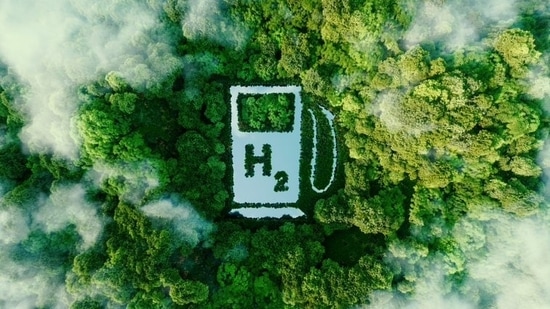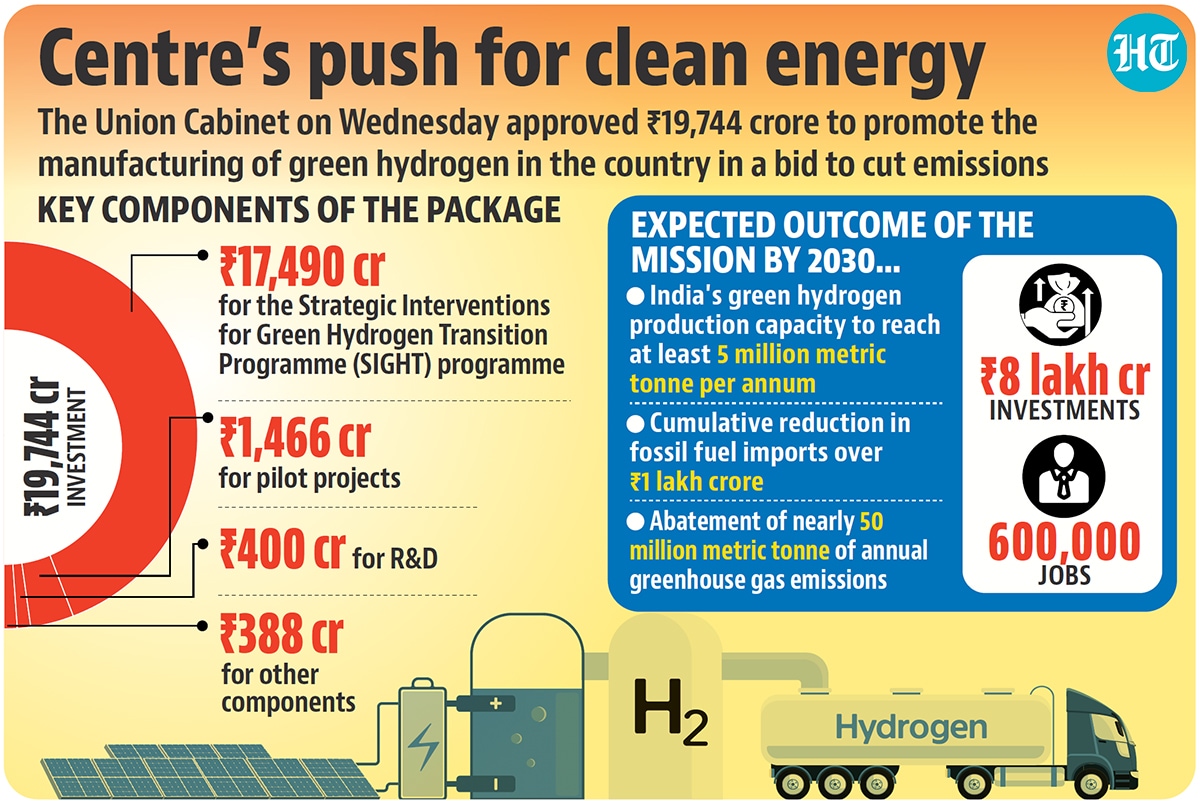Green hydrogen plan gets nod from Cabinet
In an ambitious move aimed at improving India’s energy security and helping the country cut carbon dioxide emissions, the Union Cabinet chaired by Prime Minister Narendra Modi on Wednesday approved an initial outlay of ₹19,744 crore for the National Green Hydrogen Mission up to 2029-30.
In an ambitious move aimed at improving India’s energy security and helping the country cut carbon dioxide emissions, the Union Cabinet chaired by Prime Minister Narendra Modi on Wednesday approved an initial outlay of ₹19,744 crore for the National Green Hydrogen Mission up to 2029-30, including incentives to attract investments worth ₹8 lakh crore and create 600,000 direct jobs. The mission is expected to cut around 50 million tonnes of carbon emissions.

Stating the expected deliverables of the mission after the meeting, information and broadcasting minister Anurag Singh Thakur said: “We will have annual production of 5 million tonnes of green hydrogen, it will annually reduce 50 million metric tonnes of carbon emission. Not only that; it will lead to [cumulative] savings of ₹1 lakh crore in fossil fuel imports.”
Also Read | Harness the power of green hydrogen
Hydrogen produced using renewable energy to split water (electrolysis) is termed as “green hydrogen” as opposed to “grey hydrogen” produced from fossil fuel. India plans to invest in developing an electrolysis capacity (or electrolyser capacity) of 60-100 GW as part of the effort to produce green hydrogen, Thakur added.
There are two main components of the key incentive package of ₹17,490 crore under the approved mission — about ₹4,590 crore is set aside for manufacturing of electrolyser (which breaks water into hydrogen and oxygen) in next five years, and ₹13,000 crore for producing green hydrogen in the next three years, according to an official who requested anonymity.

Besides that, the mission also set aside ₹1,466 crore for pilot projects, ₹400 crore for research and development (R&D), and ₹388 crore for other components of the mission, this person added.
“Incentives of ₹17,490 crore are expected to be available in a phased manner — for example, five-year incentive for electrolyser manufacturers may start at ₹4,440 per kw in 2025-26, which may subsequently reduce every year to ₹1,460 per kw in 2029-30,” he said. For producers of green hydrogen, this incentive could be ₹50 per kg in 2025-26 and it may reduce annually to ₹30 a kg in the third year (2027-28). The government initially aims to create up to 100 GW electrolysis capacity by 2030. The incentives are expected to bring down the cost of green hydrogen to almost the same level as that of grey hydrogen, around ₹200 a kg.
“The Ministry of New and Renewable Energy (MNRE) is expected to formulate the scheme guidelines and announce the same soon,” he added.
Speaking about the fuel of the future, Thakur said India can use green hydrogen for energy, feedstock and mobility, and also export it to other countries. Global green hydrogen demand is expected to be 100 million tonnes by 2030. The US and the EU have invested billions in their own green hydrogen campaigns. Several Indian companies have also articulated plans for the business.
“The mission will facilitate demand creation, production, utilization and export of green hydrogen… An enabling policy framework will be developed to support establishment of green hydrogen ecosystem,” Thakur said. “Our aim is to establish India as a global hub of green hydrogen.”
All concerned ministries, departments, agencies and institutions of centre and states will undertake focused and coordinated steps to ensure successful achievement of the mission objectives, he added, explaining that the government will create an empowered group involving key departments and stakeholders to facilitate the mission’s objectives. MNRE will host the mission secretariat, and a professional will head the mission as director, Thakur said.
Experts termed the mission a “crucial policy measure” in establishing India as a leader in manufacturing and production of green hydrogen. “The announcement of incentives under the National Hydrogen Mission Plan, along with the scale of likely hydrogen demand (25 MT by 2030) in the country, positions India as among the top 3 attractive nations globally for green hydrogen demand and production,” said Shubhranshu Patnaik, energy, resources and industrials partner, Deloitte India.
“What will be required alongside this ambitious mission is to create adequate demand by transiting hard-to-abate user industries through incentives and obligations towards green hydrogen,” he added.
Deepto Roy, partner at law firm Shardul Amarchand Mangaldas & Co, said: “The successful fashioning of Green Hydrogen infrastructure is key for India’s move towards net zero emissions, since green hydrogen has the potential to replace carbon heavy fuel in several key sectors. The outlay on the National Hydrogen Mission would also hopefully provide impetus to continued addition of renewable generation capacity which has been seeing some tail winds in recent times.”
Get Current Updates on India News, Ram Navami Live Updates , Lok Sabha Election 2024 live, Elections 2024, Election 2024 Date along with Latest News and Top Headlines from India and around the world.



